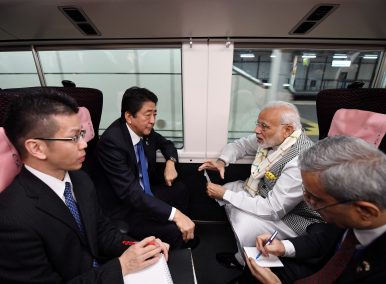By Rajeswari Pillai Rajagopalan
 India and Japan have agreed to hold a two-plus-two dialogue between the defense and foreign ministers of the two countries. This will take place ahead of the summit-level meeting between Prime Ministers Narendra Modi and Shinzo Abe later in the year.
India and Japan have agreed to hold a two-plus-two dialogue between the defense and foreign ministers of the two countries. This will take place ahead of the summit-level meeting between Prime Ministers Narendra Modi and Shinzo Abe later in the year.
The decision is no doubt a significant one, both within India-Japan relations and Indian foreign policy more generally. So far, India had engaged in such a dialogue format at this level only with the United States, the inaugural edition of which was held in September last year. But India’s new foreign minister, Dr. S. Jaishankar,and his Japanese counterpart, Taro Kono, took the decision to set this new mechanism up during a recent telephone conversation.
The concept is by no means new – the idea of establishing a two-plus-two dialogue between India and Japan was visible during the summit meeting between Modi and Abe during the former’s visit to Tokyo in October 2018. The joint statement issued following the summit meeting said that the two leaders had reiterated their “desire to further deepen bilateral security and defense cooperation and institute [a] Foreign and Defense Ministerial Dialogue (2+2)” in addition to existing institutional arrangements including the Annual Defense Ministerial Dialogue, Defense Policy Dialogue, the National Security Advisers’ Dialogue.
The upcoming Foreign and Defense Ministerial Two-Plus-Two Dialogue reflects the growing special relationship between India and Japan, which is driven by a number of factors including the desire to create an Asian strategic framework that is free, fair, and inclusive. The call for such a framework has become louder against the backdrop of increasingly muscular behavior by China. The more confrontational China becomes, the more willing countries like India are to play the balance of power games in Asia and beyond.
Traditionally, India has resisted taking sides in great power competition. But that option is becoming increasingly difficult. New Delhi has been compelled to astutely choose its strategic partners in order to strengthen its strategic maneuverability.
The India-Japan strategic partnership goes back a number of years. The two countries began a two-plus-two dialogue at the level of foreign and defense secretaries (not ministers) almost a decade ago in 2010. This dialogue was mandated by the Action Plan to Advance Security Cooperation concluded between the two countries in December 2009. Key issues discussed under this format include maritime, cyber, and outer space security.
However, Japan’s engagement with India goes back much longer. As one recent report pointed out, Japan has played an important role in developing India’s infrastructure. India is one of the largest recipients of Japan’s Overseas Development Assistance (ODA) loans since 2003, even if trade and investment levels are still modest. But in an era of strategic uncertainties driven by shifting global and Asian power dynamics, India and Japan have felt the need to strengthen their defense and security linkages.
One of the primary objectives for both New Delhi and Tokyo is to prevent the rise of a unipolar Asia dominated by one single hegemonic power. It is this political objective that has been driving the relationship and the new two-plus-two dialogue will strengthen it further, especially the security relationship between New Delhi and Tokyo.
Some aspects of this offer much promise. One such facet is military exercises, with the first joint exercise between the armies and air forces of the two countries taking place last year. On the other hand, the defense trade relationship has not seen much traction as yet. The Japanese offer of the US-2 amphibious aircraft to India is just one case in point: despite much expectation, this deal appears dead. Japan is not a major arms exporter, and the Indian military services have little experience in buying Japanese equipment. In addition, India’s notoriously difficult arms procurement process is also likely to be a hindrance.
But Japan does have a technologically advanced arms industry and it is possible that India could tap into it in order to make up for its own weaknesses in critical areas. Another area where Japan could help is with submarines: India was reported to have been interested in buying Japanese submarines, though Tokyo did not appear keen. The two-plus-two dialogue could possibly give a political push to future arms sales.
Part of the reason for the growing strategic partnership between India and Japan is that it comes with no negative baggage in either country. In India, in particular, a security partnership with Japan carries none of the connotations or controversies that continue to dog a partnership with Washington. On the other hand, this partnership by itself will not suffice to achieve the kind of Asian balance that both sides desire.
No comments:
Post a Comment